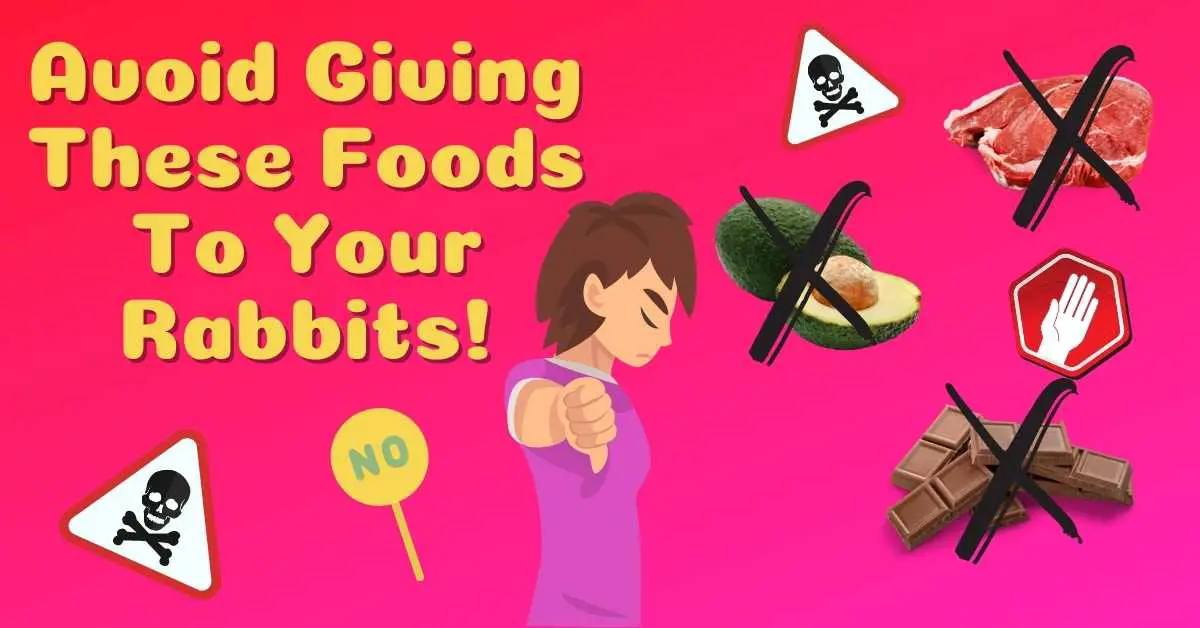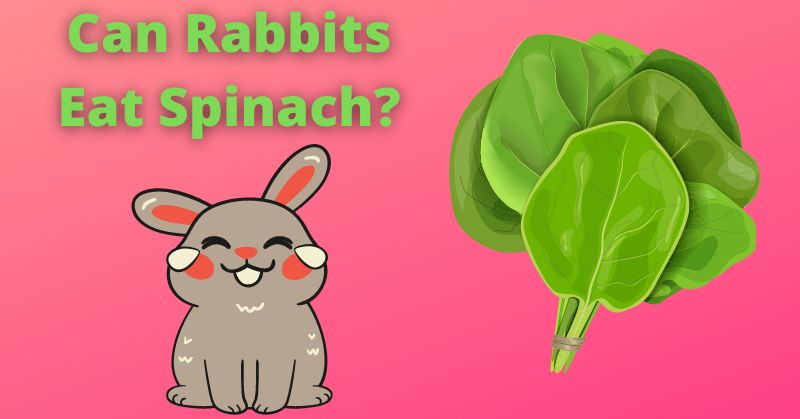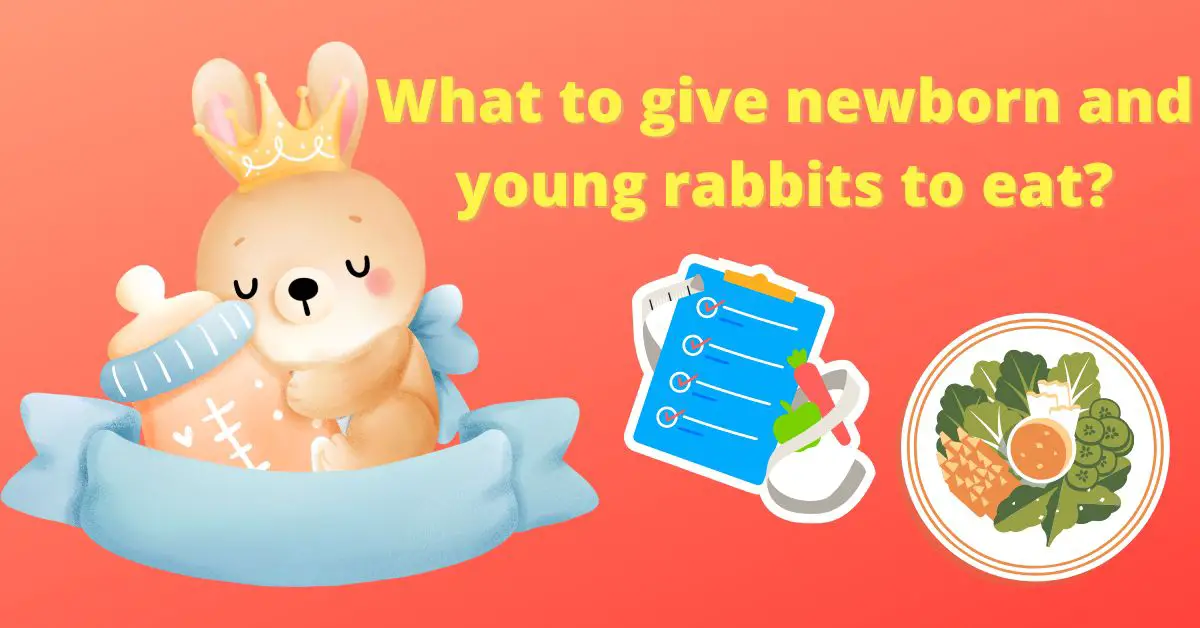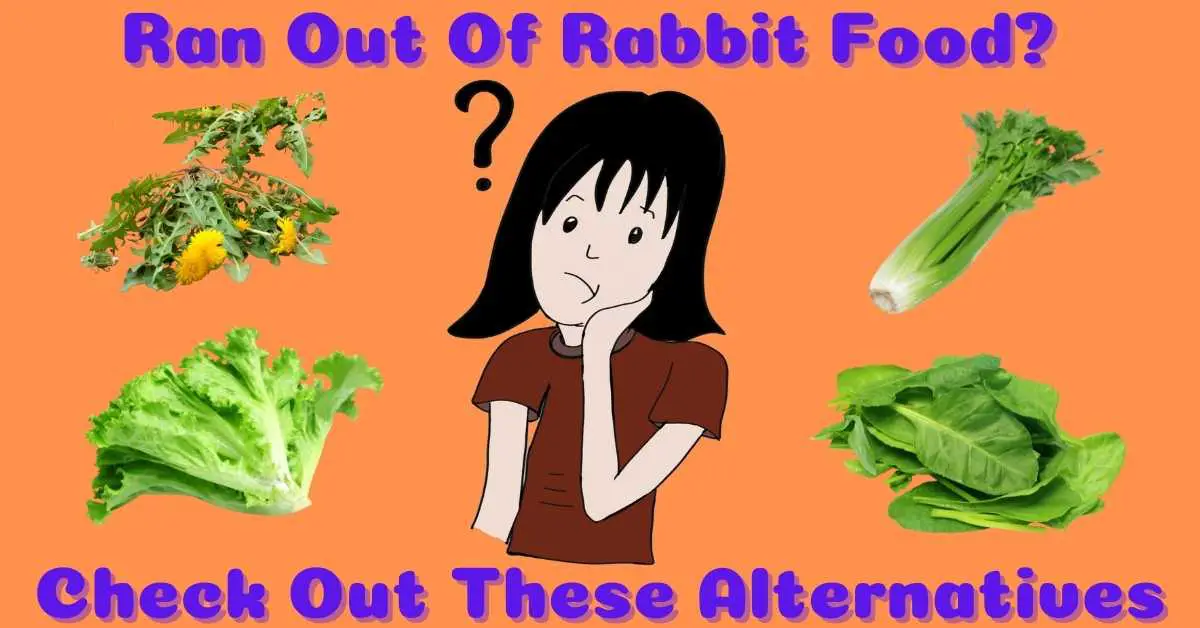If you’re a bunny owner, you probably know that these pets eat up to 30 times a day! Thus, they need a consistent supply of food but they don’t have the same dietary needs as most other pets.
Therefore, you need to know what they can and can’t consume. Moreover, you must know which foods can poison your bunny. For instance, bunnies should never be fed fruit tips, avocados, or rhubarb.
In today’s article, “Avoid Giving These Foods To Your Rabbits!“, I will share what rabbits can’t eat and discuss why they can’t consume certain foods in detail. Without any further ado, let’s learn which foods shouldn’t be consumed by bunnies.
Please also check our Ultimate Guide To Rabbit Diet, where you can find an extensive list of food to avoid and what is very good for your rabbit.
What Rabbits Can’t Eat?

Bunnies can eat a lot! They’re herbivores, however, that doesn’t mean they can consume all varieties of vegetables, greens, and fruits.
Their dietary requirements make some human treats and foods inappropriate as they can lead to health issues if consumed. The list below highlights the most common foods and treats that shouldn’t be fed to bunnies under any circumstance.
If your bunny ever consumes some of the following foods (regardless of quantity), consult your vet right away. The Veterinary Centers of America, Inc. says that a rabbit’s diet should consist of high-quality hay, timothy hay pellets, and vegetables.
However, keep in mind that you can’t feed your bunny just any veggie. Leafy green veggies make a great choice. And don’t forget the water.
The Sacramento House Rabbit Society and Veterinary Centers of America, Inc. say that the following few foods shouldn’t be fed to bunnies.
Avocados (Avoid Giving These Foods To Your Rabbits At All Costs)

Avocados contain a toxic compound known as Persin and if your bunny consumes too much of this toxic compound, it will develop breathing issues very quickly.
Therefore, avocados shouldn’t be fed to rabbits. Otherwise, this toxin can cause heart failure and eventual demise in some cases.
Yogurt drops
Rabbit.org says that yogurt drops shouldn’t be fed to rabbits because they can cause a toxic overgrowth of bad bacteria in the intestinal tract. Healthy and safe treats for bunnies include brussels sprouts, green peppers, etc.
Fruit pips and seeds
Small portions of apple flesh won’t cause harm to your rabbit, however, apple seeds shouldn’t be fed to rabbits. They have a toxin that is toxic to rabbits.
Therefore, if you prepare a few slices of apple as a treat, ensure that all of the pips and seeds have been fully removed. The same goes for plum pits, peaches, and apricot. The pips have traces of cyanide, so keep the fruit pips, pits, or seeds away from your bunny.
Bread, pasta, cookies, and crackers
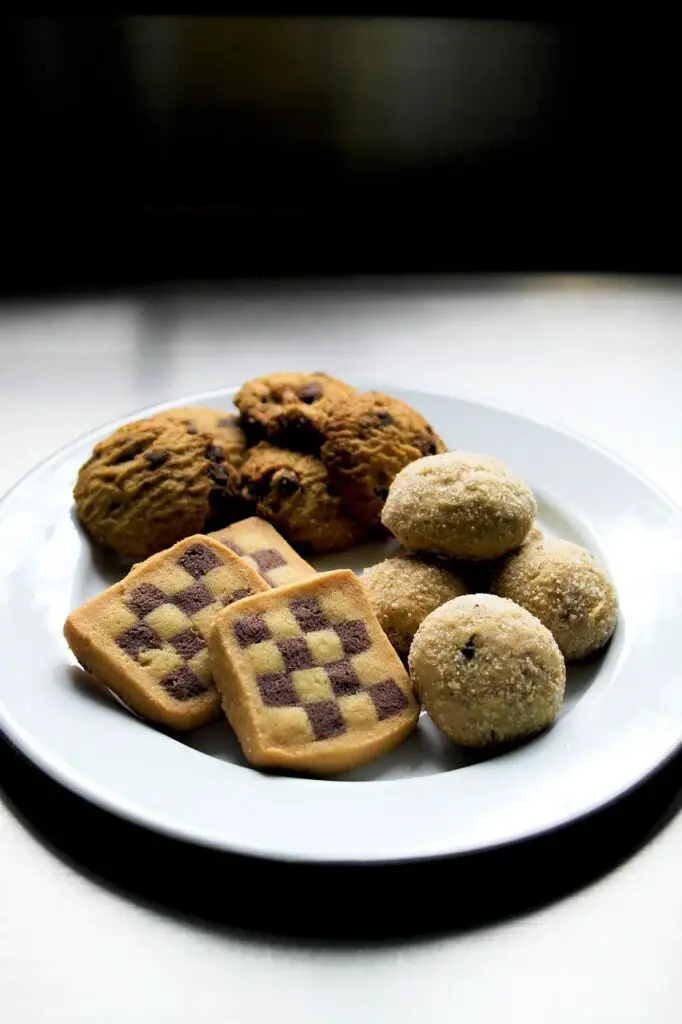
These sugary high-carb foods will only cause stomach issues in bunnies.
Therefore, avoid pasta, cookies, bread, crackers, and other foods high in artificial ingredients or sugar.
Cereal
Feeding your bunny muesli, which is a processed food made of flaked maize, pellets, peas, seeds, grains, and so on, can cause stomach and dental issues in bunnies, so avoid it.
Rhubarb
Rhubarb shouldn’t be fed to bunnies because it’s an irritant that can cause severe reactions. It’s high in oxalates which can interfere with calcium absorption. Therefore, if you have rhubarb in your garden, yard, or anywhere around your property, make sure your bunny doesn’t have access to any.
Otherwise, they will get poisoned. Symptoms of rhubarb poisoning include diarrhea, sore or bloated gut, drinking a lot of water, sore or swollen mouth, and lethargy. If you notice any of these symptoms in your bunny, consult your vet. Death isn’t common but your bunny should be treated anyway.
Iceberg Lettuce

Light-colored lettuce shouldn’t be fed to bunnies, especially Icebergs because it contains a chemical that can cause health issues if ingested.
It also contains mostly water, so it’s not very nutritious.
Silverbeet
Silverbeet, also known as chard, is another leafy green that you shouldn’t include in your bunny’s diet. It can cause your bunny to suffer from bloating and colic says a veterinary center in New Zealand. It should be replaced with vegetables, high-fiber fruits, and herbs like rosemary, radishes, alfalfa, etc.
Chocolate
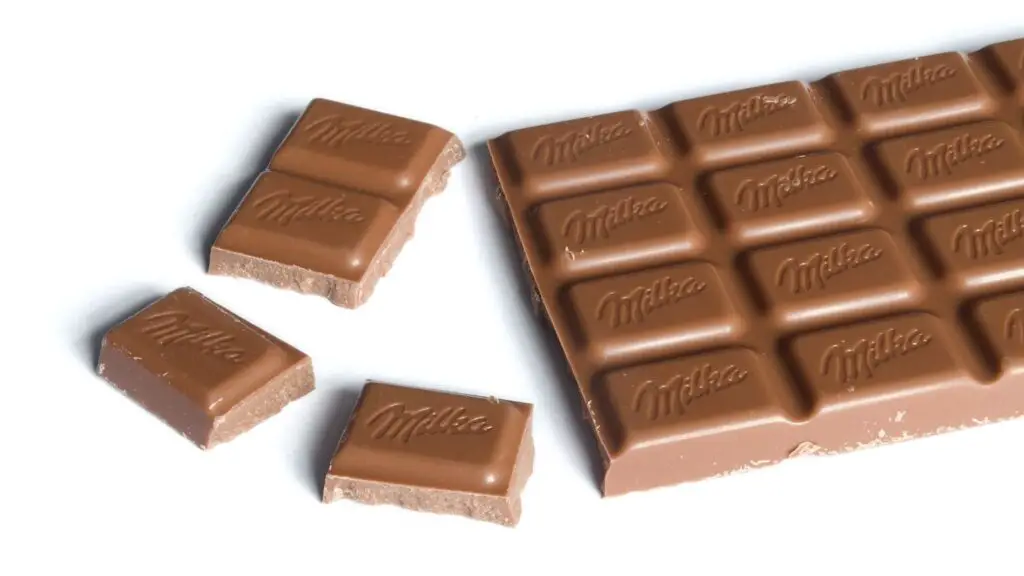
Chocolate contains caffeine and theobromine. They’re both very harmful to bunnies.
And the higher the cocoa content, the higher the concentration of these harmful compounds.
Even white chocolate can be dangerous for rabbits. PDSA says symptoms of chocolate poisoning include restlessness, vomiting, diarrhea, squirming when you try to touch their belly, panting, trembling, and a high temperature. So, keep your chocolate away from your bunny’s reach.
Hamster food
If you also have a hamster, avoid giving any of your hamster food to your bunnies. As I already stated, bunnies need special high-fiber food such as timothy hay, fresh herbs, and vegetables. Therefore, your hamster’s food won’t do much for your bunny’s nutrition.
Walnuts and peanut butter
Walnuts aren’t high in fiber. However, they’re high in fat which can cause your bunny poor indigestion. The same goes for peanut butter, so avoid both products.
Potatoes
Although potatoes aren’t poisonous to rabbits, they’re still not suitable for them because they’re high in starch and carbohydrates, which can cause stomach issues.
Meat
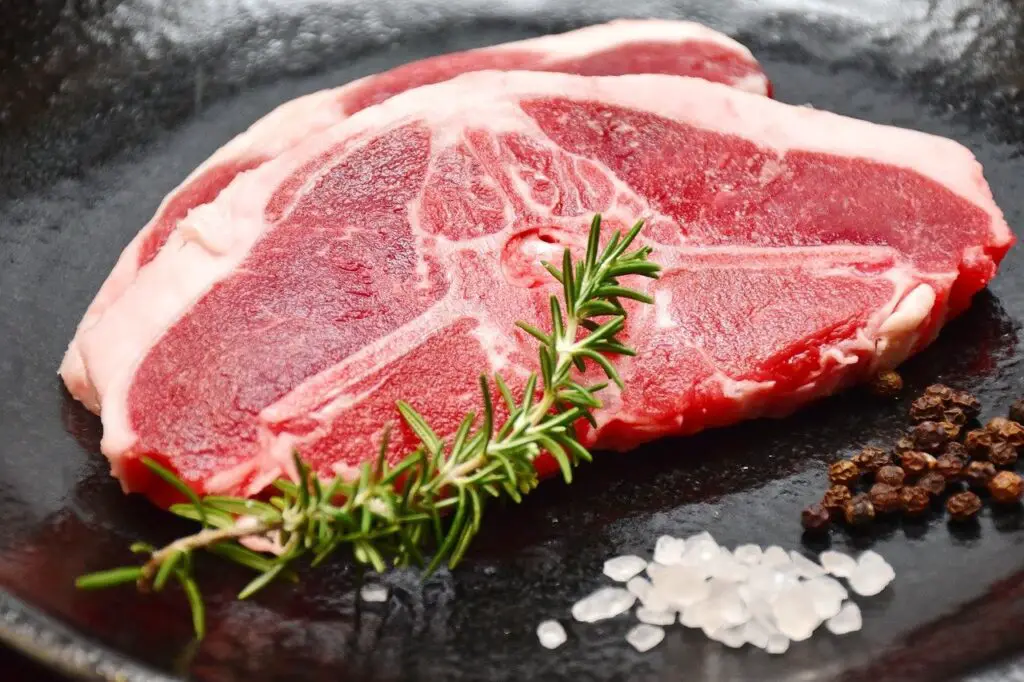
Rabbits aren’t carnivores. They’re herbivores, even wild ones. Meaning, they consume plants. Therefore, you shouldn’t include any type of meat in your bunny’s diet.
Cauliflower
Although cauliflower is a veggie, it’s still not a good snack for your bunny. Unfortunately, cauliflower can cause bloating and gassiness. Instead, feed your bunny some beets, green peppers, or radishes.
“Junk food”
Junk food includes candy, cookies, chips, hamburgers, pizza, and other unhealthy foods that aren’t very good for people let alone animals. Junk food is high in sugar and artificial ingredients that can cause the digestive system of your bunny to shut down completely which will result in demise.
Allium vegetables
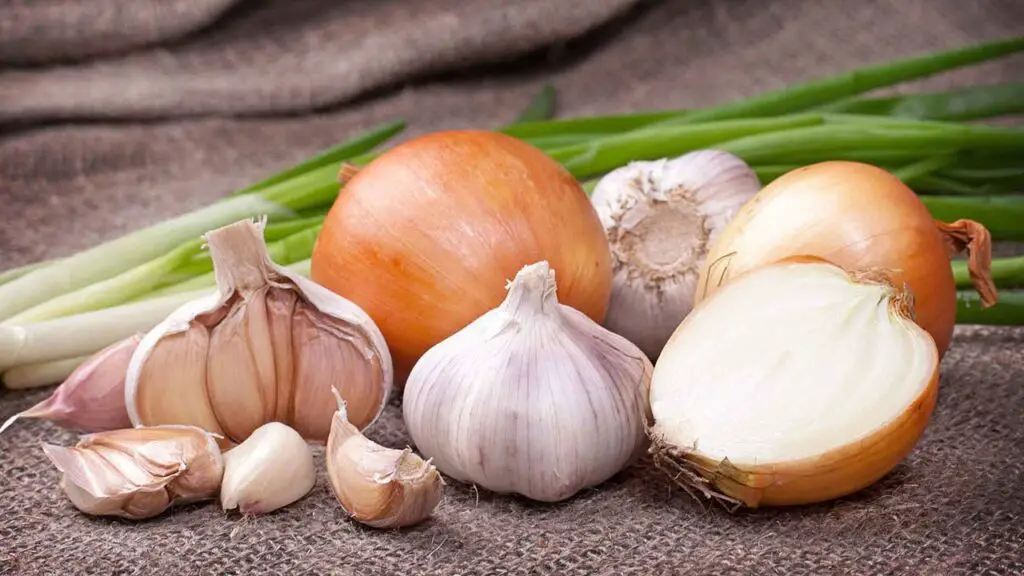
Allium-type veggies such as garlic, shallots, onions (brown and red), and chives can cause serious illness in bunnies.
The issue with these veggies is that they can cause loss of red blood cells in your bunny, also known as hemolytic anemia. And this can result in weakness, dizziness, and death if not treated.
Therefore, never feed these veggies to your bunny. And if your bunny ingests any of these veggies, call a vet. They can also cause anaphylactic shock in some bunnies, so keep them away from your pet.
Sugary processed foods
When you’re eating a piece of your favorite cake, ice cream, or cookies, you may be tempted to let your bunny have a bite, but this isn’t a good idea, according to MSD.
High-carb foods can cause Enterotoxemia (a severe case of diarrhea that’s usually fatal) in bunnies. This happens when there’s a toxic overgrowth of bacteria in the bunny’s cecum (the place between the large and small intestines). Further, this bacteria can release a toxin that’s fatal.
A single bite of sugary foods won’t cause Enterotoxemia. However, it could still occur in weak, young, or bunnies that don’t consume enough fiber, so keep that in mind.
Broad beans and kidney beans
Also known as fava beans, broad beans as well as kidney beans shouldn’t be fed to rabbits.
They’re very high in carbohydrates and can harm your bunny’s delicate gastrointestinal system resulting in diarrhea, abdominal pain, and even disruption of the gastrointestinal bacterial flora. They’re also high in calcium and phosphorus and tend to be very acidic, and therefore unbeneficial for rabbits.
Mushrooms
When humans think of toxic mushrooms, they usually envision those that mysteriously show up in their gardens or yards overnight. Although these wild mushrooms can be harmful, store-bought ones can also be harmful to rabbits.
They have various mycotoxins that stay present in the fungi whether cooked or raw and can be harmful to bunnies if ingested in larger amounts. Thus, make sure your bunny doesn’t have access to any type of mushrooms. Symptoms of mushroom poisoning in rabbits include organ damage, diarrhea, neurological deficits, and gastrointestinal discomfort.
Houseplants
Last but certainly not least, I want to mention houseplants. When buying a new houseplant, it’s safest to treat it as though it’s harmful to your pets.
Even if the houseplant you’ve bought is proven safe for bunnies to consume, it’s usually difficult to tell if it’s been exposed to any chemicals before you purchased it.
Thus, keep your houseplants out of your bunny’s reach and keep them well-trimmer so your bunny can’t snack on them when they’re unsupervised.
Last Tips
If your bunny has consumed some of the above foods, you should contact your vet.
Some of these foods can cause death in a matter of hours, so stay cautious. Foods like cookies, cake, and iceberg lettuce shouldn’t affect healthy, adult rabbits much. However, consult your vet just in case.
At times, bunnies can consume something toxic without their owners realizing it. Concerning symptoms include weakness, vomiting, diarrhea, drinking much more than usual, restlessness, and shiny eyes.
Do you have any questions or suggestions? If so, drop a comment, and let’s keep talking below!

